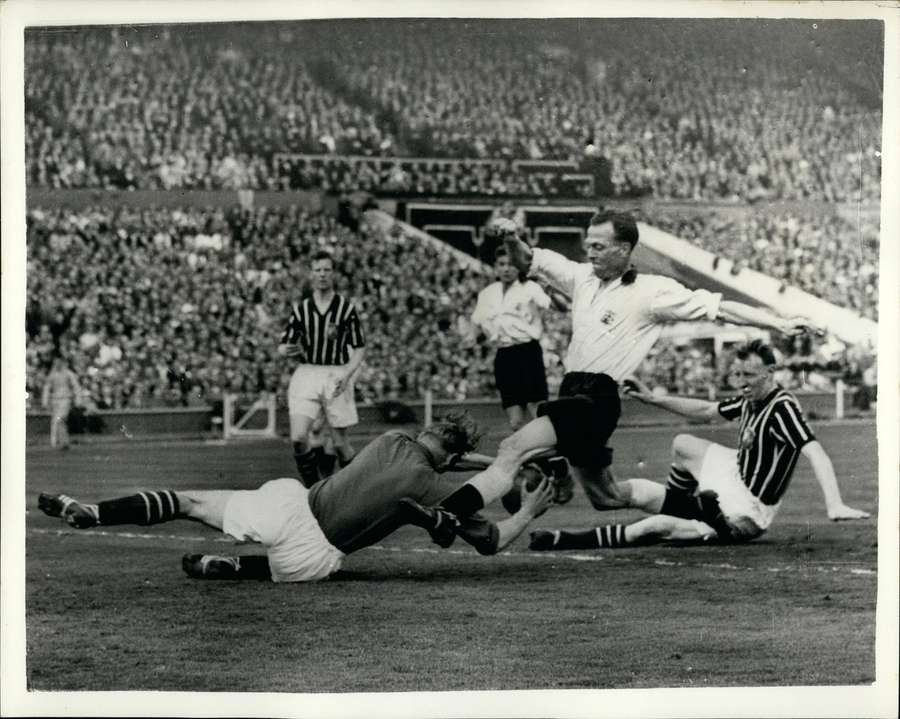Reback Flash: From the Nazi past to the heroic of football – the extraordinary story of Bert Trautmann
On May 5, 1956, Manchester City faced Birmingham City in the FA Cup final in Wembley. A crowd of about one hundred thousand spectators witnessed one of the most legendary moments of the world’s oldest football competition (the first FA Cup edition was played in 1872).
During the stages of closing the game, Bert Trautmannplaying in a goal for Manchester Citysuffered a broken neck in a harsh solution with opponents. Despite a serious injury, Trautmann finished the match and helped his team win. It symbolized its resistance and the grief of its entire history of life.
The dark past of war
Bernhard Trautmann was born into a working class family in Bremen (Germany) in 1923. When he was 10 years old, he joined Jungvolk, the new section of Hitlergulend (Hitler’s youth). Jungvolk served as an organization for boys aged 10 to 13 with a program of outdoor activities, parades and sports, and the goal of indoctrinating its new members in the principles of Nazi ideology.
Then, Trautmann joined Luftwaffe (Nazi German Air Force) at the beginning of World War II, and served as a Paratrooper. He fought in the eastern front for three years, winning five medals. Later in the war, he moved to the Western Front, where he was captured by the British as the war approached.
As a volunteer soldier, he was classified by a prisoner category ‘C’, which means he was regarded as a pure Nazi. One of the 90 of his original regiment of 1,000 men to survive the war, he was transferred to a prisoner camp in Ashton, Lancashire.
Later, Bernhard Trautmann refused a repatriation offer, and after its release in 1948, decided to settle in the Lancashire region, combining the farm with football game for a local football team, The city of St. Helens.

From zero to hero
Bernhard Trautmann’s shows in St Helens won him the English nickname Bert, and largely attracted the attention of the biggest football teams. In 1949, he signed for Manchester City, a club playing at the highest level at the time.
The club’s decision to sign a former Nazi soldier sparked protests, and 20,000 people participated in a demonstration. Over time, he won the acceptance through his performances in the city’s goal, playing at all, but five of the next 250 games of the club.
Trautmann excelled in stopping shot, especially fines, saving 60% of those he faced during his career. In addition to his great reflexes, he also stood out for his perseverance and courageous courage.
Bert Trautmann won the footballer of the year in 1956 and helped his Manchester City team win a big trophy in the same year. Final of the FA Cup on May 5, 1956, between Manchester City and Birmingham citywent down to history.
Serious injury and other fate blows
In the 75th minute of the FA Cup final, Bert Trautmann, plunging into a ball at the entrance, crashed into a collision with Peter Murphy of Birmingham City in which he was hit in the neck by Murphy’s knees. No substitutes were allowed in those days, so Trautmann, upset and unstable on his feet, continued in the match.
For the remaining 15 minutes, he defended his net, making some other essential savings. Manchester City kept the victory. Trautmann later admitted that he had crossed the last part of the ‘match’ in some kind of fog.
The severity of the injury was only detected by an X -ray examination, which Trautmann was subjected to four days after the match. His doctor diagnosed the broken vertebra and shone as ‘you must have died’.
Trautmann’s recovery lasted several months, resulting in that he lost much of the 1956/57 season. This bad period for Bert Trautmann was marked by an even worse incident. He and his wife, Margaret, an Englishman whom he met in St. Helens, lost their firstborn son, John. He was killed in a car accident several months after the FA Cup final in 1956, at the age of five.
Bert and Margaret continued to have two other sons, but their marriage was permanently drowned by John’s death. Coupleifi divorced in 1972. Bert Trautmann then married twice as much. He died in 2013 at the age of 89.
Trautmann’s incredible story is brilliantly portrayed in biographical film holders (2018), directed by Marcus H. Rosenmuller. We recommend the film a lot, and not just for football fans.